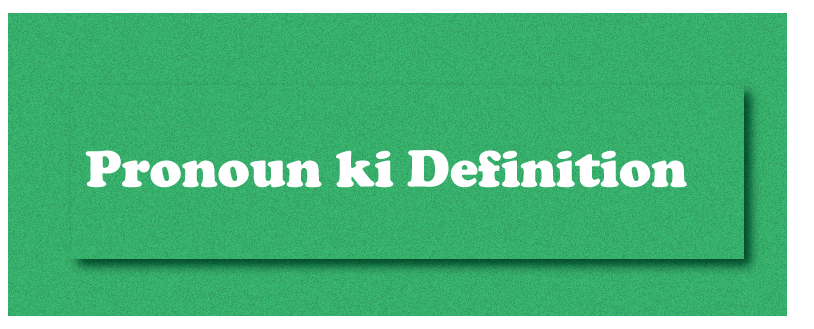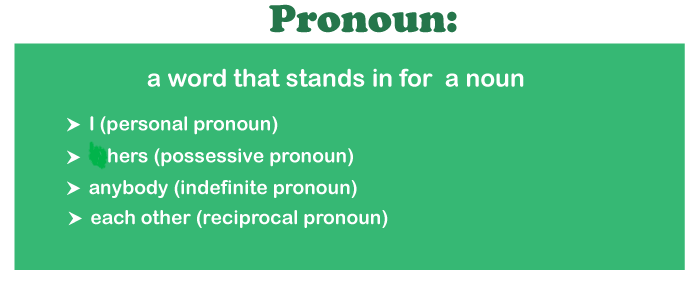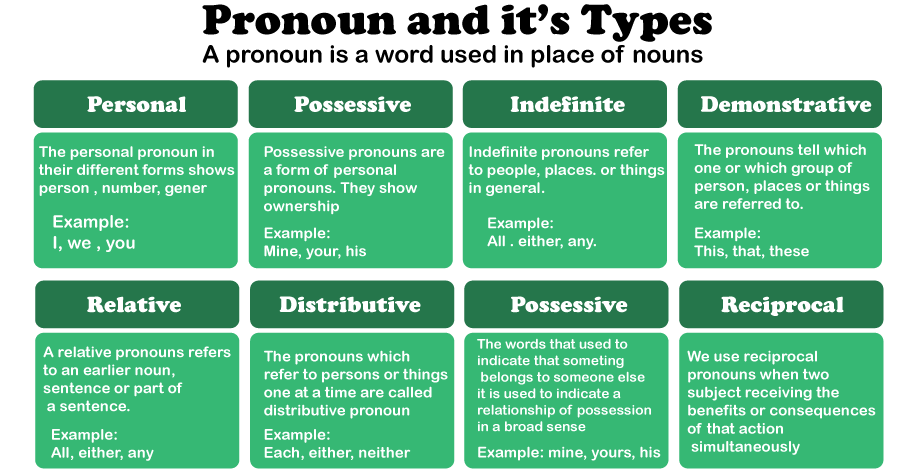Pronoun Ki DefinitionPronouns are an important aspect of English grammar because they help us express more smoothly and effectively. These are words that substitute nouns in our writing and speech, helping us to avoid repetitious or difficult phrasing. 
Knowing the various sorts of pronouns and how to use them appropriately is critical for good communication, regardless of whether you're a student, a professional, or simply someone who appreciates using language. In this blog article, we will look at pronouns in English grammar, including their many forms, functions, and common mistakes to avoid. This article will further help you learn pronoun ki definition and give you with the understanding and expertise you need to utilise pronouns confidently and successfully in your writing and speaking, from personal pronouns through reflexive pronouns and beyond. Definition Of PronounPronoun has been defined by various dictionaries. Let us have a look at the definition of pronoun by these; According to Cambridge Dictionary, a pronoun is defined as "a term that's employed rather than a noun or noun phrase, indicating to a person or thing previously named or understood from the context." Other pronoun definitions include:
What is Pronoun?A pronoun is a type of expression in English grammar that is used to substitute a noun or noun phrase in a statement. Pronouns are used to minimise duplication and to shorten phrases. 
For instance, rather than saying "Jimmy went to the market. John purchased bread. John paid for the bread. You can use pronouns to make the phrase more clear and precise: "Peter visited the shop." He went out and got bread and paid for it." Some of the common types of pronouns include ;
Pronouns are also classified according to their case, such as nominative (subjective), objective, and possessive. For example, when employed as the subject of a statement ("He visited the store"), the pronoun "he" is nominative; if utilized as the object of a verb or preposition ("Peter saw him at the shop"), it is objective; and when it denotes possession, it is possessive ("That is his hat"). Importance of PronounsPronouns are an important aspect of English grammar since they help to make sentences less repetitious and more concise. The use of pronouns can also serve to clarify the meaning of statements and improve communication. Some of the key reasons why pronouns are crucial are as follows:
Hence, pronouns are essential for good communication, expressing one's identity, and supporting inclusion and variety. They allow us to communicate more efficiently while reducing uncomfortable or repetitious phrases. Understanding the meaning of pronouns can assist individuals converse more efficiently and nicely, while also promoting diversity and variety in language usage. Pronouns And Its TypesAs a substitute for nouns or noun phrases in statements, pronouns play a crucial role in English grammar. By helping speakers and writers to avoid repeating nouns or noun phrases frequently, pronouns help to make language more precise and useful. Furthermore, the use of pronouns can help to clarify and precise language by expressing who or what is being addressed to in a phrase. Types of Pronouns
Personal PronounsPersonal pronouns are utilized to refer to individuals, animals, or objects. They differ by first, second, or third person, as well as singular and plural forms. Personal pronouns include the following:
Gender-neutral personal pronouns such as "they/them/theirs" or "ze/hir/hirs" have recently become popular to indicate non-binary people or people who do not identify with binary gender pronouns. Possessive PronounsPossessive pronouns express who possesses or has something by indicating ownership. They are also available in solitary and plural variants. Possessive pronouns include the following:
Reflexive PronounsWhen the subject and object of a phrase correspond to the same person or thing, reflexive pronouns are employed. Reflexive pronouns are always followed by "-self" or "-selves." These are some examples of reflexive pronouns:
Relative PronounsRelative pronouns are employed to indicate the relationship between two ideas by connecting dependent clauses to independent clauses. The following are examples of common relative pronouns: who, whom, whose, which, and that. Example: The novel, which was authored by Jane Austen, is a masterpiece. Demonstrative PronounsPronouns that are demonstrative refer to specific individuals, things, or ideas. They are as follows:
For instance, this coat is mine, while the other is yours. These cookies are delicious, however they are far too sugary for my taste. The demonstrative pronouns "this," "that," "these," and "those" are used to differentiate between distinct things or thoughts in both situations. "This" and "these" relate to items that are nearby or are presently being discussed, whereas "that" and "those" refer to items that are further away or are not now being discussed. Interrogative PronounsTo ask questions and obtain information, interrogative pronouns are utilised. These are as follows: who, whom, whose, which, and what. For instance, who is heading to the concert tonight ? Indefinite PronounsIndefinite pronouns refer to unidentified individuals or objects. They are as follows:
Example: Somebody left their blazer at the eatery. Pronouns are an essential component of the English language. and contribute to more efficient and precise communication. Knowing the various sorts of pronouns and how they are used is essential for good communication. As society and language evolve, so does pronoun usage, as evidenced by the emergence of new gender-neutral pronouns, for example. Common Mistakes of PronounsPronouns can be difficult to use appropriately, and many individuals make mistakes. Here are some of the most typical mistakes people make while using pronouns: Incorrect case: A pronoun's case pertains to its role in a sentence. Subjective (I, he, she, we, they), objective (me, him, her, us, them), and possessive instances are all common (mine, his, hers, ours, theirs). The incorrect use of case can make a sentence appear uncomfortable or ambiguous . For instance, him and I went shopping. (Incorrect) - "He and I went to the store." - This is correct . Correct: She provided the book to him and me . Improper Agreement: The pronoun must agree in terms of gender and number with the noun it refers to. Using the incorrect gender or plural pronoun might cause difficulties. For instance, if somebody leaves their cell phone on the floor, they should return to retrieve it. (Wrong) - "If somebody leaves their cell phone on the floor, he or she should return for it." - This is accurate. Ambiguous References: The pronoun in the phrase should explicitly refer to a specific noun. An ambiguous reference might confuse the reader by making it unclear which noun the pronoun refers to. For example, John informed his brother that he would meet him at the airport. (Ambiguous) - "Paul told his brother he would meet him at the airport." - This is obvious. When a pronoun is employed without an antecedent, the antecedent is the noun to which the pronoun refers. When a pronoun is used without an antecedent, the statement might become ambiguous or nonsensical. For example, She adored the dessert so much that it made her wish for more. (Correct) - "She adored the dessert so much that she wished more." - This is more clear. Using Nonstandard Or Created Pronouns: It is critical to use frequently recognised pronouns when communicating. Using nonstandard pronouns or inventing new pronouns might cause misunderstanding or even insult. For example, using "xe" or "ze" as pronouns rather than "he" or "she" may be unfamiliar to certain readers and can be misunderstanding. In conclusion, it is critical to utilise pronouns correctly in order to convey meaning effectively and avoid confusion. Properly using pronouns is essential for efficient communication, whether in writing or in speech. Pronouns are employed to replace nouns and reduce overuse of vocabulary. Yet, inappropriate pronoun usage can result in miscommunication and confusion. One typical error with pronouns is using the incorrect pronoun case. Pronouns are classified into three instances based on their role in a sentence: subjective, objective, and possessive. Using "me" instead of "I" as the subject of a sentence, for example, is improper, as is saying "Me and my buddy went to the shop" rather than "My buddy and I went to the shop." Another blunder is forgetting to employ the proper pronoun agreement. Pronouns must be gender and number appropriate for the noun they are substituting. When referring to a female, using the wrong gender pronoun, like "he" rather than "she," can be insulting and disrespectful. Another typical problem with pronouns is ambiguous references. This happens when the antecedent of the pronoun, the noun to which the pronoun relates, is imprecise or ambiguous. "She gave the novel to him, and he enjoyed it," for instance, can be ambiguous as it's unclear who enjoyed the novel. Finally, readers or listeners who are unfamiliar with nonstandard or created pronouns may become confused. While it is crucial to respect people's gender identities, using non-standard pronouns might impede successful communication. To avoid making these typical mistakes, it is critical to utilise pronouns appropriately by understanding their various situations, agreements, and antecedents. To encourage clear communication, it is also crucial to employ pronouns that are widely known and understood. Examples of PronounsPersonal Pronouns
Possessive Pronouns
Reflexive Pronouns
Demonstrative Pronouns
Indefinite Pronouns
Relative Pronouns
Remember, employing pronouns appropriately is essential for good communication, so take the time to make sure that you are employing them correctly. ConclusionFinally, pronouns are an important aspect of our language since they are employed to substitute nouns in sentences. It is critical to use them correctly in order to ensure that your writing or speech is clear and understandable. Remember to use the right pronoun case, to maintain pronoun agreement, to avoid unclear allusions, to use gender-neutral pronouns when proper, and to respect people's gender identities. You may improve your ability to utilise pronouns effectively by following these recommendations and practising their use in your writing and speaking.
Next TopicSimple Present Tense Definition
|
 For Videos Join Our Youtube Channel: Join Now
For Videos Join Our Youtube Channel: Join Now
Feedback
- Send your Feedback to [email protected]
Help Others, Please Share










